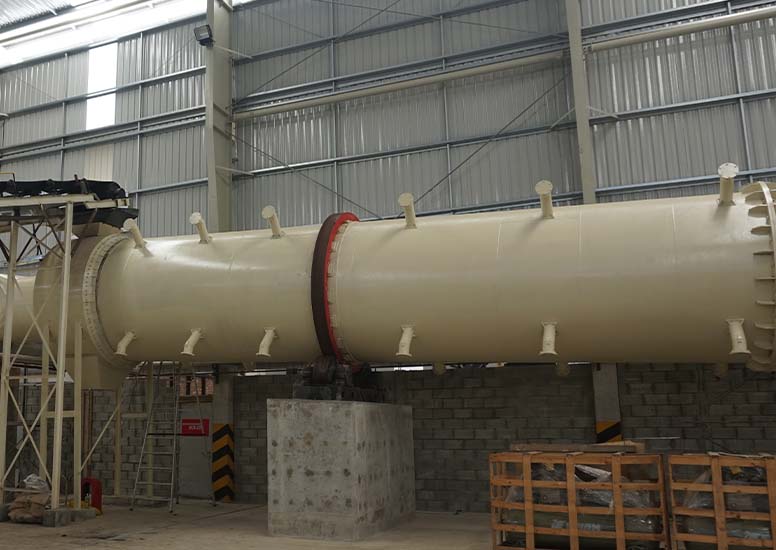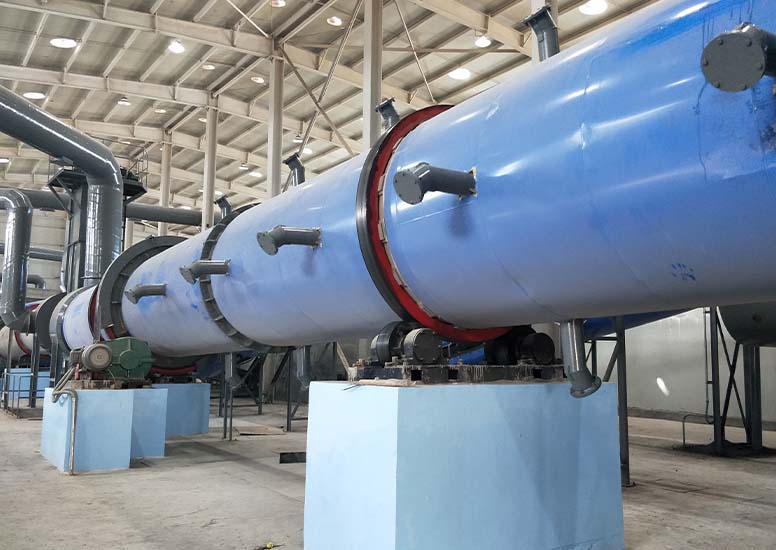Fertilizer granulation equipment & systems, process development, and parts and service support for traditional and specialty fertilizers.
A professional fertilizer granulator is a machine that converts powdered fertilizer materials into granules, enhancing their usability and effectiveness. These machines are crucial in fertilizer manufacturing, facilitating the production of both organic and inorganic (NPK) fertilizers. Granulation improves handling, storage, and application of fertilizers in agriculture.


Drum Granulator Mechanics: The series drum granulator operates via belt and pulley driven by the main motor, transmitting power through a reducer to the driving shaft. A split gear on the driving shaft connects with a large gear ring fixed on the machine body, operating oppositely. Granulation Process: Material is fed into the cylinder from the feed end, passing through its interior. Within the cylinder, a specialized structure facilitates the granulation process. Granules are then discharged through the port, enabling continuous mass production.
What is a Fertilizer Granulator?
A fertilizer granulator is a machine designed to convert raw materials (organic or inorganic) into small granules or pellets, which can be used as fertilizers. The granulator compacts the materials and shapes them into uniform-sized granules that are easy to store, transport, and apply in agricultural practices. The machine helps increase the efficiency of fertilizer production, making it easier to apply the nutrients evenly to plants, ensuring better crop growth.
Features of Fertilizer Granulator
High Output Capacity: Fertilizer granulators are designed to handle large quantities of raw materials and produce a significant amount of fertilizer in a short time.
Uniform Granule Size: The granulator ensures that the produced granules are uniform in size, which makes them easier to handle and apply.
Energy Efficiency: Modern granulators are designed to be energy-efficient, minimizing power consumption while maintaining high output.
Versatility: Fertilizer granulators can be used to process a wide variety of raw materials, including both organic and inorganic substances.
Durability: Fertilizer granulators are built to be durable, often made from high-quality materials that can withstand heavy-duty use over time.
Adjustable Granule Size: The size of the granules can often be adjusted depending on the desired output, making it flexible for different types of fertilizer formulations.
Low Dust Production: Granulators typically minimize dust during operation, making them safer to operate and reducing environmental impact.
Compact and Easy to Operate: Many models are designed to be compact, making them suitable for small, medium, and large-scale production. They are also user-friendly, with intuitive control systems.
Reduced Wastage: The granulation process helps reduce material wastage by efficiently converting raw materials into usable products.
Applications of Fertilizer Granulator
Agriculture: The primary use of a fertilizer granulator is in the agricultural industry to produce granular fertilizers that enhance soil quality and increase crop yield.
Organic Fertilizer Production: Organic waste like animal manure, compost, or plant residue can be processed into organic fertilizers using a granulator.
Chemical Industry: Fertilizer granulators are also used in the production of chemical fertilizers, which are essential for large-scale agricultural operations.
Bio-fertilizer Production: Granulators are used to produce bio-fertilizers, such as those containing nitrogen-fixing bacteria, that help improve soil fertility in an eco-friendly manner.
Recycling Agricultural Waste: Agricultural by-products such as crop residues, livestock manure, and food waste can be converted into fertilizers using a granulator, contributing to sustainable farming practices.
Environmental Protection: The granulation process can help in converting waste materials into valuable products, contributing to waste management and environmental sustainability.
Home Gardening: Some small-scale granulators are used for producing fertilizers that can be used in home gardens or by small farmers.
How to Select a Fertilizer Granulator?
Choosing the right fertilizer granulator depends on several factors related to your production requirements. Here are key factors to consider when selecting a granulator:
Production Capacity: Determine how much fertilizer you need to produce daily. Granulators come in different sizes, so choose one that matches your production needs, whether it’s for small-scale or industrial-scale operations.
Material Type: Consider the type of materials you will be processing. Some granulators are designed specifically for organic materials, while others are better suited for chemical fertilizers or mixtures.
Granule Size: The granule size should align with your end-use application. Larger granules may be required for slow-release fertilizers, while smaller granules might be used for faster nutrient release.
Energy Efficiency: Consider the energy consumption of the granulator. Energy-efficient machines will reduce operational costs in the long term.
Raw Material Moisture Content: Some granulators are better suited for dry materials, while others can handle higher moisture levels. Check the granulator specifications to ensure it matches your material’s properties.
Durability and Build Quality: Ensure that the granulator is made of high-quality materials that can withstand long-term use and heavy workloads.
Ease of Operation: Choose a granulator that is easy to operate, maintain, and clean. A user-friendly interface and proper training can reduce downtime and increase productivity.
Customization: Some granulators allow customization of features like granule size, moisture level, and mixing speed. If you need specific requirements, opt for a customizable machine.
Cost: Consider your budget. Fertilizer granulators come in a range of prices, so make sure to select one that balances cost with the required features for your production needs.
Maintenance and Support: Check for the availability of spare parts, maintenance services, and the reputation of the manufacturer for after-sales support. A good warranty and reliable customer support are critical for long-term machine performance.
Technology Features: Some advanced granulators come with digital controls, automatic adjustments, and real-time monitoring systems, offering better precision and efficiency. Decide if such features are necessary for your operation.
Environmental Considerations: Choose a granulator that minimizes waste and pollution. Machines that produce less dust, noise, and emissions are better for both the environment and worker safety.